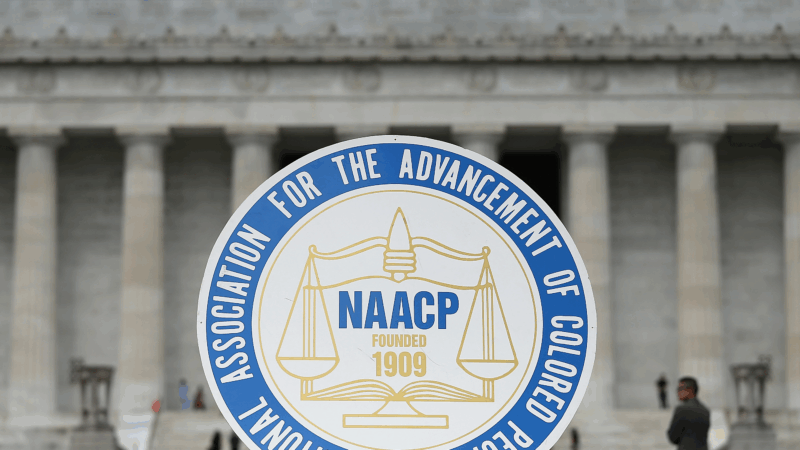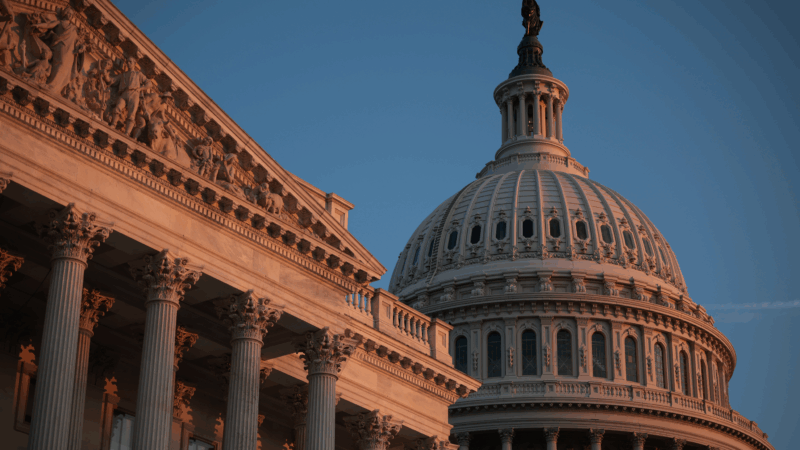NAACP won’t invite Trump to its national convention, breaking a 116-year tradition
The NAACP announced it will not invite President Trump to its national convention in July. The civil rights organization is breaking from its 116-year tradition of welcoming the sitting U.S. president to the annual event that draws NAACP supporters from around the country.
The group says Trump is the first president it has declined to invite.
NAACP President and CEO Derrick Johnson made the announcement Monday at a news conference in Charlotte, N.C., where the convention is scheduled to be held. The group also shared a statement from Johnson.
“Donald Trump is attacking our democracy and our civil rights … The president has signed unconstitutional executive orders to oppress voters and undo federal civil rights protections,” Johnson said. “… he continually undermines every pillar of our democracy to make himself more powerful and to personally benefit from the U.S. government.”
The White House responded sharply on Tuesday to the president’s exclusion from the event. Trump declined previous invitations during his first term.
“The NAACP isn’t advancing anything but hate and division, while the President is focused on uniting our country, improving our economy, securing our borders, and establishing peace across the globe,” White House spokesperson Harrison Fields said in a statement to NPR. “This is the same vision for America that a record number of Black Americans supported in the resounding reelection of President Trump.”
The NAACP has welcomed both Democratic and Republican presidents to address the convention over the years. Presidents have historically used their remarks to build stronger ties with the Black community.
President Ronald Reagan addressed the NAACP convention in Denver in 1981 and spoke out against racism and discrimination. President George W. Bush spoke at the convention in Washington, D.C., in 2006 amid criticism of his administration’s handling of Hurricane Katrina. The storm disproportionately affected Black residents in New Orleans and the Gulf region. In his remarks, Bush resolved to work with the Black community to recover from the storm. He had declined previous invitations to the event.
The NAACP has filed a number civil rights lawsuits against the administration since Trump’s return to the White House, including a challenge to efforts to cut federal funding to schools that use diversity, equity and inclusion (DEI) programs. The organization has also filed suit to block plans to dismantle the U.S. Department of Education.
The Trump administration has enacted a series of substantial changes that the NAACP says conflicts with its mission of achieving equity, political rights, and social inclusion for Black Americans and all people of color. The changes include eliminating DEI programs in higher education and across the federal government; removing some Black historical figures from government websites; and restoring the names of military bases that originally honored white supremacists and owners of enslaved people.
Team USA faces tough Canadian squad in Olympic gold medal hockey game
In the first Olympics with stars of the NHL competing in over a decade, a talent-packed Team USA faces a tough test against Canada.
PHOTOS: Your car has a lot to say about who you are
Photographer Martin Roemer visited 22 countries — from the U.S. to Senegal to India — to show how our identities are connected to our mode of transportation.
Looking for life purpose? Start with building social ties
Research shows that having a sense of purpose can lower stress levels and boost our mental health. Finding meaning may not have to be an ambitious project.
Sunday Puzzle: TransformeR
NPR's Ayesha Rascoe plays the puzzle with listener Joan Suits and Weekend Edition Puzzlemaster Will Shortz.
Danish military evacuates US submariner who needed urgent medical care off Greenland
Denmark's military says its arctic command forces evacuated a crew member of a U.S. submarine off the coast of Greenland for urgent medical treatment.
Only a fraction of House seats are competitive. Redistricting is driving that lower
Primary voters in a small number of districts play an outsized role in deciding who wins Congress. The Trump-initiated mid-decade redistricting is driving that number of competitive seats even lower.






